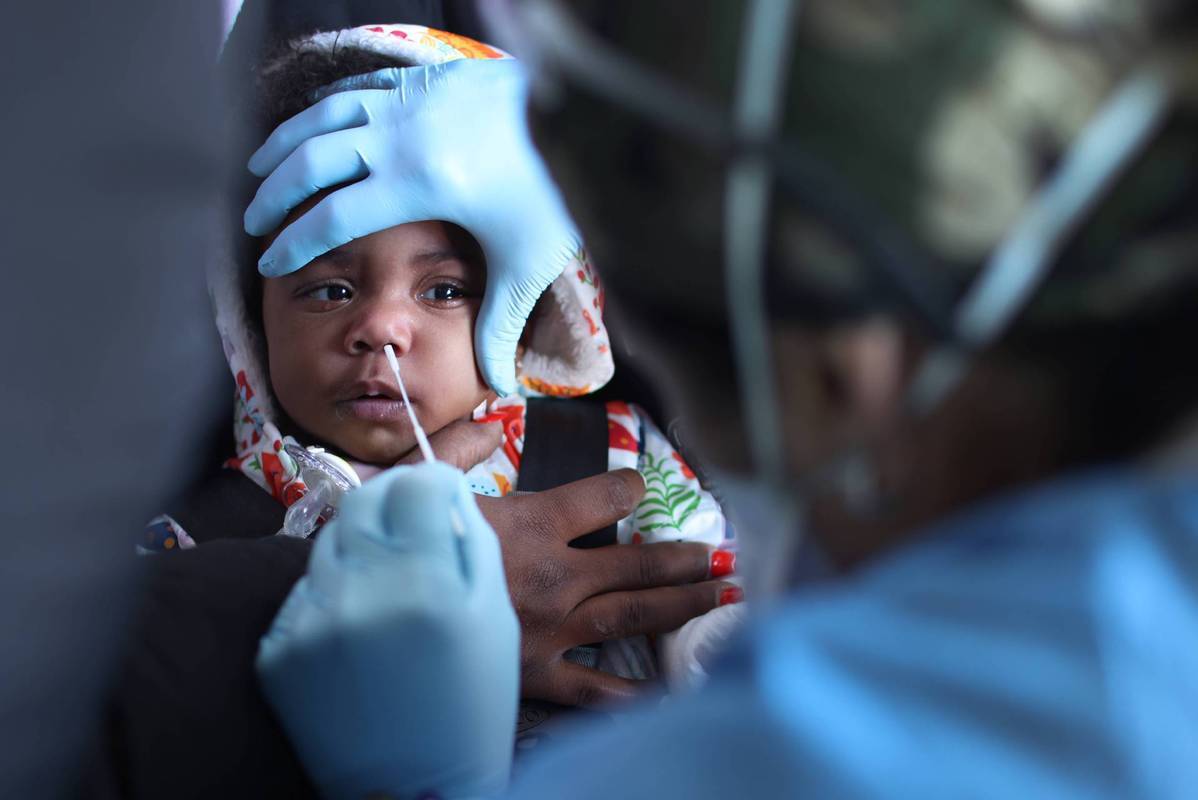
A child is tested for the COVID-19 virus at Roseland Community Hospital on Dec 14, 2020 in Chicago, Illinois. (Photo: Agencies)
The poor performance of the US in COVID-19 response is no wonder one of the biggest "black swans" of 2020. The "systematic fracture" is believed by the US society to be a major reason why the world's No. 1 economic and tech power failed in this regard.
The BBC warned in a March 24 article that the coronavirus pandemic could mark another 'Suez moment' for the US The New York Times listed 1,000 names of the US citizens who died of COVID-19 on its front page on May 24 as the country's COVID-19 death toll neared 100,000. In late September, the TIME magazine printed its cover with dates and death counts listed back to back to mark an approaching milestone in the coronavirus pandemic — 200,000 related deaths, calling it an "American failure." The New England Journal of Medicine, in an editorial published on Oct. 8, pointed out that the US has "taken a crisis and turned it into a tragedy." In the Nov. 30 issue of the TIME, the magazine once again warned that the US is now locked in a deadly cycle.
Since Nov. 3, the US has been recording over 100,000 new confirmed coronavirus cases a day. The growth exacerbated in December, and so did the daily deaths. So far, there have been over 18.93 million confirmed COVID-19 cases and 330,000 deaths in the country.
The TIME pointed out a systematic fracture of the US revealed by the pandemic. "Republicans and Democrats today don't just disagree on issues; they disagree on the basic truths that structure their respective realities. Half the country gets its news from places that parrot whatever the Administration says, true or not; half does not."
A recent report by the Washington Post said public health officials and many political leaders hoped that covid's frightening lethality might unite the country, but the nation's deep divisions — political and cultural — set the country on a different path.
The World Health Organization reiterated the importance of solidarity in facing the pandemic, as divisions would only create opportunities for the virus. However, even the US community admitted that their country has been trapped in larger divisions due to the pandemic.
For instance, the small masks mirror the big problems of political polarization and social divide in the US Some shops welcome only customers with masks, while some prevent them from entering. A survey done by the Pew Research Center on June 25 found 63 percent of Democrats and Democratic-leaning independents believed that masks should be worn always, while the figure was only 29 percent among Republicans and Republican leaners.
American analytics and advisory company Gallup also discovered that 94 percent of democrats always use masks, compared to 46 percent of Republicans who said the same.
The Pew Research Center suggested a sharp divide of the two parties' views on US COVID-19 response. Eighty-eight percent of democrats said the country did a bad job in controlling the pandemic, while only 30 percent of republicans supported such point. Sixty-six percent of republicans even believe the impacts from the pandemic were exaggerated.
Richard Haass, President of the Council on Foreign Relations of the US, said in an article that the America is one country with two nations.
The US has long suffered from political polarization and social divide. What's unfortunate is that when the pandemic is politicized, the country's containment measures are "blackmailed" by political polarization and social divide, and the two amplify each other. Just because of the political polarization and social divide, the US society is always unable to reach an agreement on the choice between saving life and developing economy.
Given the fake news that is highly politicized, truth and science are placed on the opposite side of people's health. Bill Gates, co-chair of the Bill & Melinda Gates Foundation said it's pathetic to politicize the pandemic. Anthony Fauci, director of the National Institute of Allergy and Infectious Diseases of the US, who received serious threats from people angry over his advice on the pandemic, remarked that these attacks were a reflection of the "divisiveness of our society at political level." Rick Bright, director of the Biomedical Advanced Research and Development Authority, is also pessimistic about the politicization of the pandemic, believing the US is heading toward "darkest winter in modern history."
It is much to be regretted that the social divisiveness and the out-of-control pandemic in the US are continuing accelerating one another, costing numerous lives. What the US citizens need are actions that can effectively curb the virus. However, their interests are still not cared about. No wonder the US media had to comment that "the US is sleepwalking into what could become the largest coronavirus outbreak of the pandemic so far."


